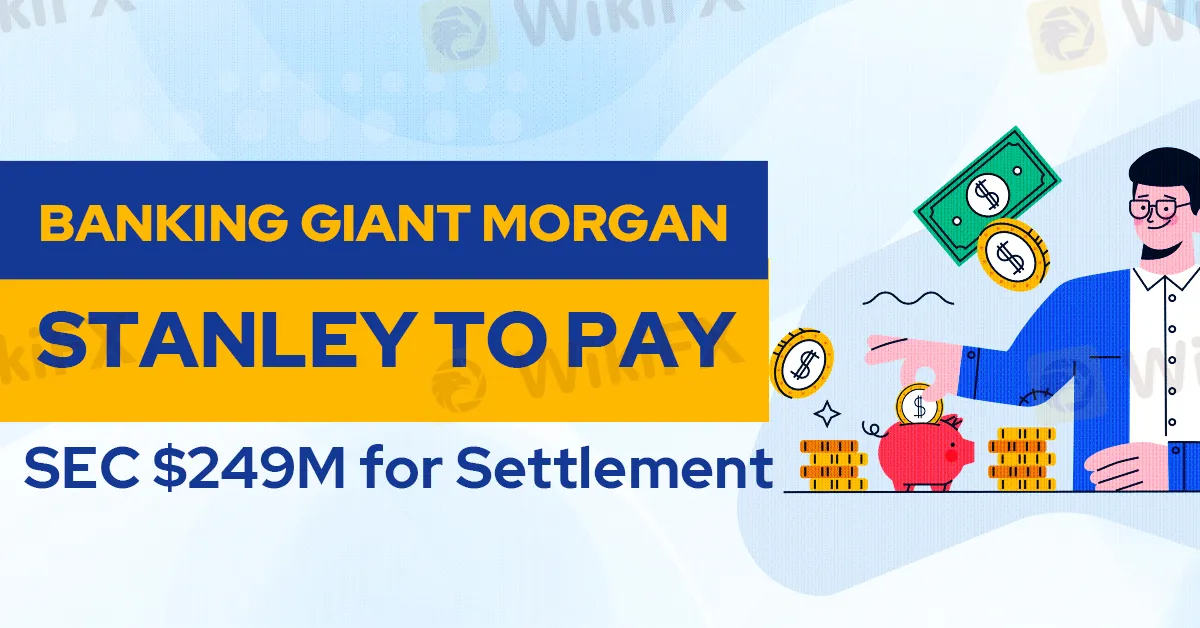简体中文
繁體中文
English
Pусский
日本語
ภาษาไทย
Tiếng Việt
Bahasa Indonesia
Español
हिन्दी
Filippiiniläinen
Français
Deutsch
Português
Türkçe
한국어
العربية
Banking Giant Morgan Stanley to Pay SEC $249M for Settlement
Abstract:This article unravels the Securities and Exchange Commission's charges against Morgan Stanley & Co. LLC and its former equity syndicate desk head, Pawan Passi, exposing a multi-year fraud involving the unauthorized disclosure of confidential information in the realm of block trades.

Last week, the Securities and Exchange Commission (SEC) brought charges against Morgan Stanley & Co. LLC, a prominent investment banking giant, and Pawan Passi, the former head of its equity syndicate desk. The charges pertain to a lengthy period of fraud involving the disclosure of confidential information related to the sale of substantial quantities of stock, commonly referred to as “block trades.” Additionally, the SEC accused Morgan Stanley of neglecting to enforce its policies addressing the misuse of material non-public information linked to block trades.
Block trades typically involve the private arrangement and execution of a substantial number of shares of a company's stock outside the public markets.
According to the SEC's findings, spanning from June 2018 to August 2021, Passi and a subordinate on Morgan Stanley's equity syndicate desk revealed non-public, potentially market-moving information about imminent block trades to select buy-side investors. This disclosure occurred despite confidentiality requests from the sellers and Morgan Stanley's own policies concerning confidential information handling.

The SEC's orders assert that Morgan Stanley and Passi shared the block trade information with the expectation that the buy-side investors would utilize it to “pre-position” themselves by taking significant short positions in the stock slated for the impending block trade.
As per the SEC orders, in the event that Morgan Stanley proceeded to purchase the block trade, the buy-side investors would then seek and receive allocations from Morgan Stanley to cover their short positions. This pre-positioning strategy effectively mitigated Morgan Stanley's risk in acquiring block trades.
The SEC's order also notes Morgan Stanley's failure to implement effective information barriers, preventing material non-public information about specific block trades from being transmitted by the equity syndicate desk, situated on the private side of Morgan Stanley, to a trading division on the public side. Consequently, the firm could not adequately scrutinize whether trades by that division, made while the equity syndicate desk was in talks with selling shareholders regarding potential block trades, were based on confidential discussions.
The SEC's order against Morgan Stanley determines that the firm willfully violated Sections 10(b) and 15(g) of the Securities Exchange Act of 1934 and Rule 10b-5(b) thereunder. As a result, the firm is censured and required to pay around $138 million in disgorgement, approximately $28 million in prejudgment interest, and an $83 million civil penalty.
Concerning Pawan Passi, the SEC's order finds him willfully violating Section 10(b) of the Exchange Act and Rule 10b-5 thereunder. He is mandated to pay a $250,000 civil penalty and faces associational, penny stock, and supervisory bars.
In a simultaneous development, the U.S. Attorney's Office for the Southern District of New York announced criminal resolutions with both Morgan Stanley and Passi. The SEC's ordered disgorgement and prejudgment interest for Morgan Stanley will be considered partially satisfied by the firm's forfeiture and restitution, totaling $136,531,223, as part of its criminal resolution.

Disclaimer:
The views in this article only represent the author's personal views, and do not constitute investment advice on this platform. This platform does not guarantee the accuracy, completeness and timeliness of the information in the article, and will not be liable for any loss caused by the use of or reliance on the information in the article.
Read more

Doo Prime Officially Launches Trading for OFFICIAL TRUMP (TRUMP/UST)
Trade OFFICIAL TRUMP (TRUMP/UST) now on Doo Prime! Discover exciting opportunities in cryptocurrency trading with low spreads, top platforms, and blockchain technology.

Teen Among 7 Busted in Shocking Online Investment Scam
A 17-year-old boy and six others face charges for allegedly running a fraudulent investment scheme in Taman Ekoflora. While the six adults pleaded guilty, the teen denied the charges. The group could face penalties under Section 120B(2) of the Penal Code. The court will reconvene on March 6 to decide on sentencing.

High Risk, High Returns: Is This True?
Leverage is one of the most talked-about tools in trading. It promises big returns but comes with huge risks. Traders often wonder if leverage is a blessing or a curse. There are arguments on both sides. Some traders believe it is a game-changer. Others think it can ruin your account. What is your take on this?

FCA Plans to Transform Financial Regulations in the UK
The Financial Conduct Authority (FCA) has revealed plans to reform its regulatory framework to support economic growth in the United Kingdom.
WikiFX Broker
Latest News
Plus500 Collaborates with Topstep, Prop firm
Robinhood Launches Crypto Trading Services in Spain
Archax Secures FCA Approval to Oversee Crypto Promotions in the UK
CLS Global Admits to Crypto Fraud
Philippine SEC Urges Caution Regarding Ecomamoni
Become Women Brand Ambassador of Yamarkets
Naira Falls Against Dollar as Nigeria Reshapes Economic Blueprint
How Often Do U.S. Recessions Impact Online Trading Trends?
Scam Impersonating U.S. Treasury Token Issuance Spreads on Social Media
Is eToro Leaving London to Focus on a $5B U.S. IPO in 2025?
Currency Calculator


